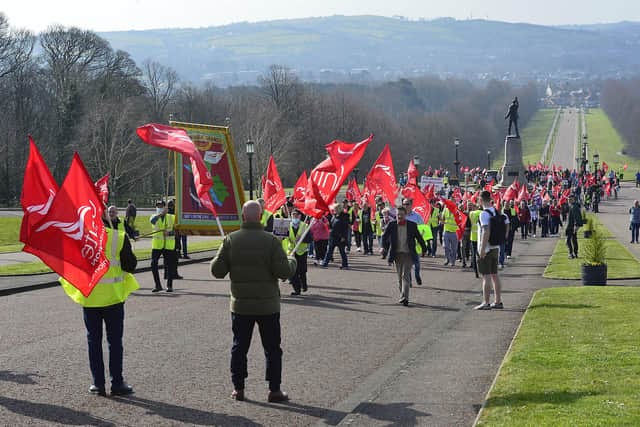Recent wave of strikes only ‘tip of the iceberg’ with growing ‘anger’ and ‘militancy’ among essential workers, says senior trade unionist


Owen Reidy, from the umbrella body ICTU which represents most trade unions in Northern Ireland, said in an interview with the News Letter that a renewed sense of “anger” and “resurgent militancy” amongst workers following the pandemic, along with the soaring cost of essentials such as food and fuel, is likely to bring a more “concerted” wave of strikes by around October and November.
Northern Ireland has already been rocked by several strikes in both the private and public sectors, with workers at Caterpillar, BT, local councils, the Education Authority and a host of others having all staged walkouts in a bid to secure better pay.
Advertisement
Hide AdAdvertisement
Hide AdSeveral teaching unions have decided to ballot members on possible strike action after the summer holidays, while trade unions in the health service have expressed concern about whether a recent pay recommendation will be awarded to staff here due to the power-sharing crisis at Stormont.
Mr Reidy, one of Northern Ireland’s most senior trade unionists, said: “The industrial action we’ve seen so far is only the tip of the iceberg, quite frankly. We have seen some significant industrial action so far. You are seeing Unite in the public sector and some parts of the private sector with ballots and industrial action securing decent pay increases.
“You are going to see, I think, in late summer and early autumn in education the teachers considering their situation and their options as well. You’re probably going to see other public sector workers, whether it’s health or it’s the civil service, considering their options as well. We’re seeing the CWU in BT at the moment.
“You have to remember this is the summer time. With the energy crisis, in winter heating and fuel will be even more of an issue. I think that’s when we’re going to see a lot more industrial action both north and south of the border and right across Britain.”
Advertisement
Hide AdAdvertisement
Hide AdOn the impact of the pandemic, he said: “Many workers who will be going on strike, and have been on strike in the last couple of months, are the very same people we all realised were essential workers.
“Having gone through the pandemic, there’s an anger and a resurgent militancy that is because of our experiences of the pandemic. We were all in it together? Well, clearly we’re not in it together at all because some people are doing very well and some people are struggling. The people who are struggling are saying ‘no more’.”
He added: “What are workers to do if you have a government in England that isn’t interested, you have no government in Northern Ireland, and you have employers you are not prepared to engage in a meaningful way for a decent, unprecedented increase for unprecedented times? What are they meant to do, other than take industrial action?
“So, yes, I think we will see a lot more of it and we will support all our union affiliates with whatever action they have. I think we will see a more concerted approach come the autumn, for sure.
“I think you’re going to have a perfect storm, probably by October and November.”